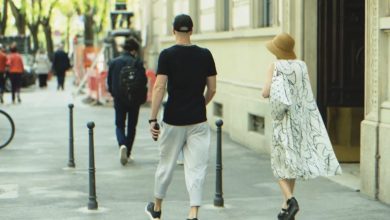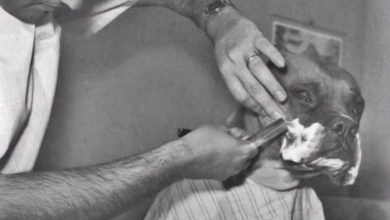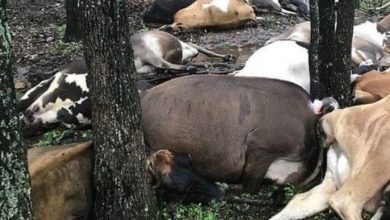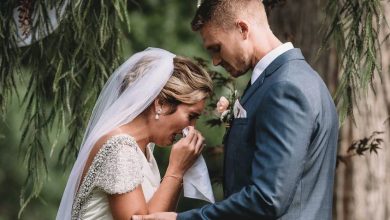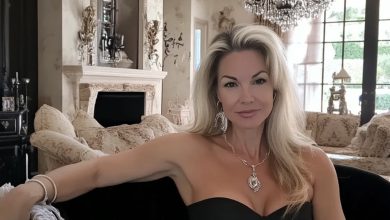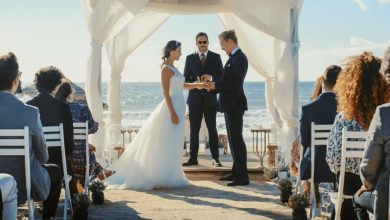“She Humiliated Me in Front of Everyone at My Own Wedding — Until My Father Took the Microphone and Silenced the Entire Room”
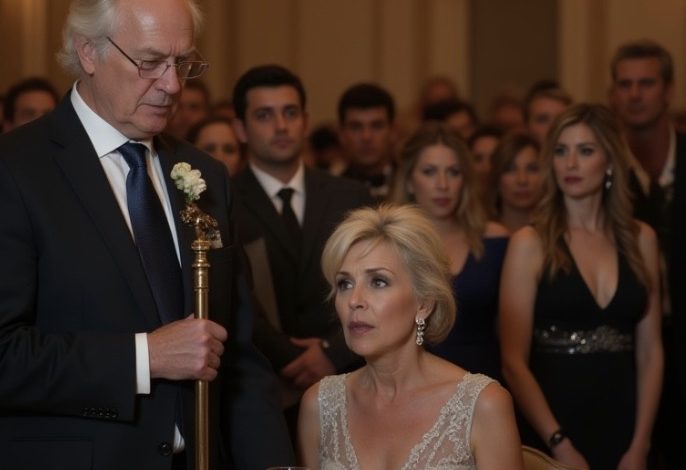
At the wedding, my mother-in-law lifted her glass with the pride of a queen and said, “The apartment will go only to my son — this bride gets nothing.”
The room froze. Laughter stopped midair. Every eye turned toward her — and then toward me.
For a long moment, no one moved. Then my father, a quiet man with hands rough from years on the road, slowly stood up and said, calm but steady, “Now, it’s my turn to speak.”
What he said next would silence everyone — even her.
The Golden Shore restaurant sparkled like a stage. Every corner shone with polished glass, white tablecloths, and gold-trimmed plates. The chandeliers scattered light like captured stars. To anyone looking in from outside, it was a perfect celebration — expensive, grand, filled with laughter.
Today was the day Ethan and I — Anna Peterson — became husband and wife. And on the surface, everything was flawless.
But I felt out of place. Not because I wasn’t happy, but because I didn’t belong to the kind of world my new family came from.
I had grown up the daughter of a truck driver. My father, Alexander Peterson, had spent most of his life on long highways, driving through storms and snow, always returning with stories and gifts he could barely afford. My dress — a simple rented gown — was the most beautiful thing I had ever worn. Ethan, my husband, looked elegant and confident in a tailored suit his mother had picked for him.
And his mother, Svetlana…
Svetlana was the kind of woman who filled a room without saying a word. Tall, perfectly styled, with sharp eyes that missed nothing. She had the calm arrogance of someone used to being obeyed. When she smiled, you weren’t sure if it was kindness or warning. To her, this wedding wasn’t about love — it was a show of power, a proof that her son’s marriage would still orbit around her.
I felt her gaze more than once that evening, scanning me from head to toe. I knew what she saw — not a rival, not an equal, but a girl from a different world.
Guests filled the hall: on Ethan’s side, businessmen, socialites, and partners from his mother’s company; on mine, a handful of friends and relatives — simple people, genuine, dressed in their best clothes and smiling proudly. My father stood out among them, a strong figure with kind eyes, his worn suit freshly pressed.
The ceremony went beautifully. Glasses clinked, people cheered, and for a brief time, I forgot the differences that separated us. I saw only Ethan’s smile and the way his hand never left mine.
Then came the toasts.
After the emcee’s cheerful words, after a few sentimental speeches from friends, Svetlana stood. She didn’t need the microphone; her voice carried naturally, practiced and clear. She smiled, smoothing her elegant gown, and addressed the crowd.
“Dear guests,” she began, “tonight we celebrate the union of my beloved son, Ethan, and his lovely bride, Anna. As a mother, there is nothing more precious than seeing your child happy.”
Applause filled the hall. Ethan smiled politely. I tried to smile too.
Svetlana raised her hand for quiet. “And,” she continued, “as a mother, I believe in giving my son the best start in life. So, my husband and I have decided to give the newlyweds a wedding gift — an apartment in the city center.”
Another wave of applause. People turned toward us, smiling, congratulating. I blushed, grateful. Ethan squeezed my hand under the table.
But then she wasn’t done.
She waited for silence again, her lips curling in that poised, perfect smile. “However,” she said, her tone now colder, sharper, “I must clarify one important detail. The apartment will belong only to my son, Ethan — because this poor country girl will not be getting any of it.”
The words hit like a slap.
The music stopped. The applause died instantly. You could hear the faint hum of the chandelier above us. I saw faces freeze — confusion, disbelief, awkward pity.
Ethan dropped his gaze to his plate. His hand slipped from mine. He looked small, almost frightened.
My heart pounded in my chest. Every part of me wanted to run — but I didn’t. I lifted my chin and looked straight at Svetlana. Her eyes met mine, cold and triumphant. I realized then that this wasn’t just about money — it was about power. She wanted to humiliate me in front of everyone, to remind me that in her world, I didn’t belong.
But I refused to let her see me break.
I sat still. My face calm, my back straight. I wasn’t going to cry.
Across the room, I saw my father. His eyes — the same eyes that had watched the road for thirty years — looked at me with quiet pride. And then he began to move.
He stood up slowly, pushing his chair back. The murmur of conversation stopped. He straightened his jacket, walked to the front of the hall, and reached for the microphone. His hands were strong, rough from years of labor, gripping the stand with quiet determination.
Svetlana crossed her arms, watching with a smirk. She thought he would apologize — maybe stammer through some speech about misunderstanding or gratitude. She couldn’t imagine that a man like him could match her in dignity.
She was wrong.
My father cleared his throat. His voice was deep but calm, carrying easily across the hall. “Good evening,” he began. “I’m not very good with speeches. I spend most of my days behind the wheel, not behind a microphone. But tonight, I have a few things to say.”
The room fell silent again. Every eye turned to him. Even the waiters stopped moving.
He looked at Svetlana. “You said this night is about giving,” he said. “About what people deserve. I’d like to share my thoughts, too.”
He turned slightly, scanning the room. “My daughter, Anna, grew up in a small home, not a palace. But she grew up with love. With hard work. With respect. Maybe she doesn’t know what it’s like to have servants or luxury vacations, but she knows how to care for others, how to stay humble, and how to love honestly.”
People listened — really listened. Even those who moments ago had laughed nervously now sat upright, their eyes fixed on him.
“I drove thousands of miles every year,” he went on, “through storms and heat, missing birthdays and holidays. I didn’t always have much, but everything I earned went to her. And today, seeing her here, I can say I’ve done something right.”
He paused. You could hear glasses clinking in the background, faint and nervous. Then he looked at Ethan.
“You’re a lucky man, son,” he said gently. “You’ve married a woman with a heart of gold. I hope you’ll take care of her.”
Svetlana shifted in her seat, irritated. My father didn’t even glance her way.
He continued, his tone now stronger. “You see, I don’t own apartments in the city. I don’t have investments or companies. But I do have something. A house. A simple house I built with my own hands. Board by board, brick by brick. It’s not fancy. But it’s warm. It’s a place filled with love and peace. And I’ve decided to give that house to Anna and Ethan — in her name. So they’ll have a home of their own, built from real work, not pride.”
Gasps rippled through the crowd.
For a moment, no one spoke. Then a few people started clapping. Then more. Applause grew until the hall echoed with it. People stood, raising their glasses. Some had tears in their eyes.
Svetlana’s face went pale, then red. Her smile vanished. She tried to maintain her composure, but her lips trembled. This wasn’t how the night was supposed to go.
My father turned to me, smiling. “That’s all I wanted to say,” he finished softly.
I stood up, tears finally spilling down my cheeks — not from humiliation, but from pride. I ran to him and hugged him tightly. “Thank you, Dad,” I whispered. “Thank you for everything.”
He kissed my forehead. “Always, sweetheart.”
Ethan rose slowly, as if waking from a long sleep. He looked at my father, then at his mother, then back at me. And something changed in his face — the uncertainty, the fear — it was replaced by determination. He walked to my father, extended his hand, and said, “Thank you, sir. For your words. For your daughter. For reminding me what really matters.”
My father gripped his hand firmly. “Then be a man,” he said simply. “Be worthy of her. Build your own life. Love her — and don’t let anyone else live it for you.”
Ethan nodded, deeply moved.
Svetlana sat motionless, eyes unfocused, lips pressed tight. The image of control she had worn all evening cracked. Around her, guests whispered softly, glancing her way but no longer fawning.
The band started playing again. This time, the music felt different — warmer, more human. Laughter returned, but now it was real, not forced. People toasted my father’s health, clapping him on the back.
Ethan took my hand. “Dance with me,” he said quietly.
We stepped onto the dance floor. For the first time that evening, I felt like I belonged there. The music swelled, and we moved together slowly, as if we were the only two people in the room. I saw my father watching from the table, smiling through tired eyes.
In that moment, I realized what love really looked like — not diamonds or designer dresses, but quiet strength, loyalty, and pride.
Later, as the night went on, the tension melted away. People laughed again, told stories, and joined the dance. Svetlana remained seated for a long time, her face distant. But eventually, she stood up and quietly left the room, slipping out without a word.
Ethan and I danced until the lights dimmed. When we finally sat down, I leaned close to him and whispered, “I’m proud of you.”
He looked at me, his eyes clear. “I’m proud of your father,” he said. “He taught me more in five minutes than my whole life of luxury ever did.”
We smiled at each other, both knowing something had changed forever.
When the night ended, my father offered to drive us. But Ethan shook his head. “We’ll go ourselves,” he said. “To our home.”
We said our goodbyes. My father hugged us both, his voice steady but full of feeling. “You’ll always have a place with me,” he said.
Outside, the city lights flickered in the distance. Ethan and I got into the car. For the first few minutes, neither of us spoke. The silence wasn’t awkward — it was peaceful, full of meaning.
Finally, I said softly, “You don’t regret anything?”
Ethan shook his head. “No. For the first time, I feel free.”
We drove through the quiet streets, leaving behind the glitter and coldness of the restaurant, heading toward the suburbs — toward my father’s house.
When we arrived, the small wooden home looked like something out of a dream. A soft light glowed in the windows. The garden, lined with flowers and fruit trees, smelled of summer. My father stood on the porch, waiting.
“Welcome home,” he said simply.
We stepped inside. The warmth of the house wrapped around us. The living room was simple — wooden furniture, framed photos, soft rugs. It wasn’t luxurious, but it felt real.
“It’s beautiful,” Ethan said quietly.
I nodded. “It’s perfect.”
We sat together by the small fireplace, holding hands. For the first time that day, we truly relaxed. The chaos, the tension, the cruelty — all of it stayed behind in that golden hall. Here, there was only peace.
My father joined us for tea. We talked and laughed until late into the night. When he finally went to bed, Ethan turned to me. “I’ll never forget what your father said,” he murmured. “He showed me what being a real man means.”
I smiled. “He’s always been my hero.”
Ethan kissed my forehead. “Now he’s mine too.”
The next morning, sunlight spilled through the curtains. Birds sang outside. We walked together in the garden, hand in hand. Everything felt simple, right, and new.
Suddenly, Ethan’s phone rang. He frowned when he saw the name. “It’s Mom,” he said.
He answered. “Yes, Mom?”
For a moment, silence. Then Svetlana’s voice came, softer than I’d ever heard it. “Ethan,” she said, “I wanted to say I’m sorry. I was wrong yesterday. I didn’t mean to hurt Anna. I thought I was protecting you, but I see now I wasn’t.”
Ethan was quiet. Finally, he said, “Thank you for saying that.”
“I’d like to see you both,” she said. “Maybe you can come over. I’d like to know Anna better.”
He looked at me. I nodded. “We’ll come,” he said gently.
When he hung up, he smiled faintly. “She apologized.”
I took his hand. “Maybe she’s learning too.”
We stood in the sunlight, surrounded by the quiet hum of the morning, and looked at the house — our new home.
A small, humble place. But built on something money could never buy: love, respect, and courage.
And in that moment, I knew — our real life had just begun.

